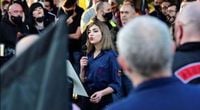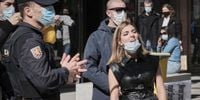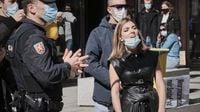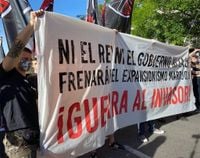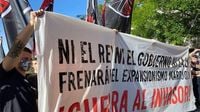The Provincial Prosecutor's Office of Madrid has requested a sentence of three and a half years in prison for Isabel Peralta, the leader of the neo-Nazi group Bastión Frontal, for inciting discrimination and hatred against Moroccan migrants and Muslim individuals. This request comes as part of an ongoing legal battle that has captured public attention due to its implications on freedom of speech and the rise of far-right movements in Spain.
Peralta, who has gained notoriety for her inflammatory rhetoric, is accused of urging violence and hostility during an unauthorized demonstration held on May 18, 2021, in front of the Moroccan Embassy in Madrid. The protest was organized in response to a migration crisis that saw a significant influx of migrants from Morocco to the Spanish enclave of Ceuta. During the rally, Peralta read a manifesto to approximately 250 attendees, which the Prosecutor's Office claims incited violence against Moroccan migrants and Muslims.
According to the Prosecutor's Office, Peralta's statements were not only provocative but also constituted a serious attack on the dignity of the individuals targeted. Her speech included phrases like "the problem is not Morocco, but the Spanish Government, which facilitates the arrival of immigrants who destroy our culture and identity." This sentiment reflects a broader narrative among some far-right factions in Spain that associate immigration with cultural dilution and societal threats.
Peralta's rhetoric escalated during the demonstration, where she was quoted as saying, "We are going to stand up to them, death to the invader!" Such language has raised alarms about the potential for real-world violence, particularly given that her words were echoed by the crowd, which chanted slogans such as "It is not immigration, it is an invasion!" and "Christian Spain and not Muslim!" This atmosphere of hostility is further exacerbated by the group's display of banners that read, "Neither the King, nor the Government, nor the EU will stop Moroccan expansionism," and other inflammatory messages.
The demonstration, which was broadcast live on social media, garnered significant attention, receiving over 7,844 views on YouTube. The Prosecutor's Office has pointed to this as evidence of the widespread dissemination of hate speech and its potential impact on the broader community. The live streaming of such events raises questions about the responsibility of social media platforms in curbing hate speech and preventing the spread of extremist ideologies.
In the wake of the protest, clashes erupted between members of Bastión Frontal and law enforcement, resulting in multiple injuries and the arrest of five individuals. The confrontations underscored the volatile nature of these gatherings and the potential for violence that often accompanies far-right demonstrations.
The case against Peralta has been under investigation for several years, reflecting the growing scrutiny of hate speech and its consequences in Spain. The upcoming trial, scheduled for April 3, 2025, will not only determine Peralta's fate but also serve as a barometer for how the Spanish legal system addresses hate crimes in an increasingly polarized society.
In addition to the prison sentence, the Prosecutor's Office is seeking a 12-month fine of nine euros per day, which totals over 3,000 euros, and a ten-year ban from engaging in educational professions. This multifaceted approach highlights the seriousness with which the authorities are treating the case, aiming to deter similar behavior in the future.
Peralta's history of public appearances and her leadership role within Bastión Frontal have made her a prominent figure in Spain's far-right landscape. Her past statements, including controversial remarks made during a Phalangist event in 2021 where she claimed, "The enemy will always be the same, although with different masks: the Jew," further illustrate her alignment with extremist ideologies.
The rise of groups like Bastión Frontal and the rhetoric employed by their leaders pose significant challenges to social cohesion in Spain. As the country grapples with issues of immigration and national identity, the legal proceedings against Peralta will likely spark renewed debates about freedom of expression, the limits of political speech, and the responsibilities of citizens and leaders in promoting social harmony.
As Spain prepares for the trial, many are watching closely to see how the judiciary will navigate the complexities of hate speech laws and whether it will set a precedent for future cases involving far-right extremism. The outcome could have lasting implications for how hate speech is defined and prosecuted in the country, impacting not only those involved in the case but also the broader societal discourse surrounding immigration and cultural identity.
In conclusion, the prosecution of Isabel Peralta represents a critical moment in Spain's ongoing struggle with extremism and the challenges posed by rising nationalism. The forthcoming trial will not only address the specific actions of one individual but will also reflect the societal values concerning tolerance, diversity, and the rights of marginalized communities in the face of growing hostility.

